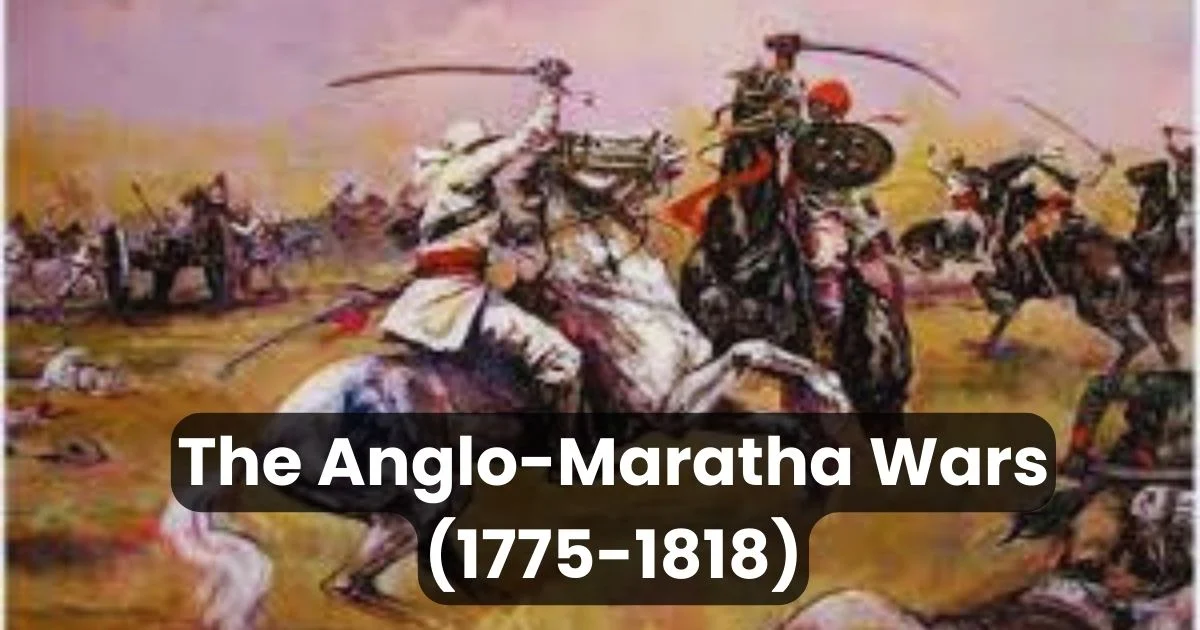The Anglo-Maratha Wars stand as pivotal chapters in the annals of Indian history, marking the clash between the expanding British Empire and the formidable Maratha Confederacy. Spanning three major conflicts, these wars shaped the political landscape of 18th and early 19th century India. Let’s embark on a journey through these tumultuous times, unraveling the intricate tapestry of warfare, diplomacy, and cultural exchange.
First Anglo-Maratha War (1775-1782):
The seeds of conflict were sown amidst the crumbling Mughal Empire, as the Marathas, under the leadership of Peshwa Madhavrao I, sought to assert their dominance in the wake of Mughal decline. However, the rising power of the British East India Company posed a threat to Maratha ambitions.
The spark that ignited the first war was the Treaty of Surat (1775), wherein the British supported Raghunath Rao, a claimant to the Maratha throne, against the Peshwa. This betrayal of Maratha trust led to hostilities, with battles raging across western India.
Key engagements included the Battle of Wadgaon (1779), where Maratha guerilla tactics inflicted a humiliating defeat on the British, forcing them to sign the Treaty of Salbai (1782). The treaty restored status quo ante bellum, but tensions simmered, foreshadowing future conflicts.

Second Anglo-Maratha War (1803-1805):
The dawn of the 19th century witnessed the resurgence of hostilities, as British expansionism collided with Maratha territorial ambitions. The catalyst for the war was the Treaty of Bassein (1802), wherein Peshwa Baji Rao II sought British aid against internal rivals.
The British, under the leadership of Lord Wellesley, seized the opportunity to expand their influence, initiating a campaign against the Marathas. Key battles, including Assaye (1803) and Laswari (1803), showcased British military prowess, culminating in the Treaty of Bassein (1802) and the subsequent Treaty of Rajghat (1805).
The treaties dismantled Maratha sovereignty, establishing British suzerainty over vast territories and reducing the Peshwa to a puppet ruler. The Marathas, fragmented and weakened, would never fully recover their former glory.

Third Anglo-Maratha War (1817-1818):
The final act in this epic saga unfolded against the backdrop of growing discontent among Maratha chieftains, resentful of British interference in their affairs. The Pindaris, a band of marauders, provided the pretext for British intervention, as they ravaged the countryside under Maratha patronage.
Led by the Duke of Wellington and Governor-General Lord Hastings, British forces launched a decisive campaign, crushing Maratha resistance in battles such as Koregaon (1818) and Khadki (1817). The capture of key Maratha strongholds, including Pune and Gwalior, spelled the end of Maratha independence.
Also Read: Vinayak Damodar Savarkar – The Revolutionary Patriot And Thinker
Conclusion:
The Anglo-Maratha Wars, spanning nearly half a century, represent a tumultuous chapter in Indian history, marked by ambition, betrayal, and resilience. These conflicts reshaped the geopolitical landscape of the subcontinent, paving the way for British dominance and the end of Maratha sovereignty. Yet, amidst the carnage and chaos, echoes of valor and defiance endure, reminding us of the indomitable spirit of those who fought for freedom and glory.
FAQs:
What were the main causes of the Anglo-Maratha Wars?
The primary causes included British expansionism, Maratha territorial ambitions, internal Maratha conflicts, and the decline of the Mughal Empire.
What were the major battles of these wars?
Key battles included Wadgaon (First War), Assaye and Laswari (Second War), and Koregaon and Khadki (Third War).
What were the outcomes of these wars?
The Anglo-Maratha Wars resulted in the erosion of Maratha power, the establishment of British dominance in India, and the eventual demise of the Maratha Confederacy.
Are there any recommended books on this topic?
Scholars recommend “The Marathas: 1600-1818” by Stewart Gordon, “The Anglo-Maratha Campaigns and the Contest for India” by Randolf G. S. Cooper, and “The Maratha War Papers” edited by G. S. Sardesai for in-depth analysis.
Hope our blog on the “Anglo-Maratha Wars” was helpful to you !!





